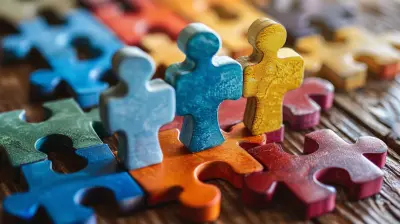The Impact of Grief on Brain Function and Decision-Making
21 November 2025
Grief. It’s one of those feelings that grabs you and doesn’t let go. Whether it’s the loss of someone close, a broken relationship, or even major life changes like losing a job or moving away from home—it hits hard. But have you ever stopped to wonder what grief actually does to your brain? I mean, beyond the sadness, the tears, and the emotional rollercoaster.
Let’s dive into what’s really happening upstairs when you’re grieving—and how that affects the choices you make every day.
What Is Grief, Really?
Before we go full neuroscience, let's get one thing straight: grief isn’t just a short-lived period of sadness. It’s a complex, deeply personal experience that affects your emotions, physical body, and, yes… your brain function.Think of grief like an unexpected storm. It moves in waves—sometimes calm, sometimes overwhelming—and everyone rides it differently. Some people seem to bounce back quickly, while others struggle to get out of bed. That’s because grief doesn't play by any rulebook. It messes with your inner system on every level.
How Grief Impacts the Brain: It’s Science, Not Just Feelings
You might assume grief is all emotional, but it’s actually neurological too. When we experience loss, our brain kicks into overdrive trying to process it. This can cause temporary—or even long-term—changes in how we think, process information, and react to the world around us.Let’s break down what exactly goes on inside the brain.
1. The Amygdala: Your Brain’s Alarm System
Ever felt like your emotions were on edge after losing someone? That’s your amygdala lighting up like a Christmas tree. This tiny almond-shaped part of the brain is responsible for processing emotions like fear, anger, and sadness.When you’re grieving, the amygdala becomes hyperactive. Everything feels more intense. Random memories can trigger tears, small frustrations feel unbearable, and even normal conversations can feel overwhelming.
It’s like your emotional radar is stuck on high alert—because, in a way, it is.
2. The Prefrontal Cortex: The “Boss” Goes on Break
If the amygdala is the emotional engine, then the prefrontal cortex is like the CEO making rational choices. It’s responsible for decision-making, problem-solving, and regulating your emotions.During grief, this part of the brain doesn’t operate optimally. Why? Because grief demands so much energy and mental bandwidth that it’s like your brain diverts resources away from logic and control.
So, if you’ve ever made irrational decisions while grieving—impulse purchases, risky behavior, or simply being unable to decide what to eat—that’s not just you. It’s your brain struggling to function as usual.
3. The Hippocampus: Memory Gets Messy
The hippocampus is the part of your brain that handles memory and learning. When you’re grieving, this part can shrink temporarily due to high cortisol levels (aka the stress hormone).This means your memory may feel foggy, and your ability to absorb new information can be affected. You might find yourself forgetting appointments, misplacing your keys, or rereading the same page in a book five times.
It's not laziness or distraction—it’s grief physically altering your brain’s ability to function.
Decision-Making While Grieving: A Mental Hurdle Course
Now that we’ve peeked inside your brain, let’s talk about how this translates into real-life decisions. Making smart, intentional choices while you're grieving? Easier said than done.Emotional Hijacking
When the amygdala is in overdrive and the prefrontal cortex is on vacation, emotions start running the show. This is called "emotional hijacking."Simply put, you're more likely to react emotionally rather than logically. That means rash decisions. Saying things you don’t mean. Lashing out. Or doing things you wouldn't normally do—all because your brain is more focused on survival than strategy.
Decision Fatigue
Grief is exhausting. Mentally and physically. Between the constant emotional pull and the cognitive overload, it's no wonder even small decisions feel impossible.Have you ever stood in the grocery aisle staring at pasta sauce for 10 minutes? Grief can make you indecisive about even the tiny stuff.
Why? Because your brain is simply maxed out. Every choice feels harder when you're emotionally drained.
Avoidance and Procrastination
Let’s be real: sometimes, grief just makes you want to hide. Important decisions pile up—career moves, financial choices, medical care—but you put them off. Not because you’re lazy, but because facing them feels too heavy.This avoidance isn’t about a lack of motivation. It’s your brain trying to protect you from more emotional strain. But of course, the longer you delay, the more pressure builds up.
Grief and Risky Behavior: A Dangerous Cocktail
Here’s something that doesn’t get talked about enough: grief can lead to risky or self-destructive behavior. Why? Because when the brain's emotional center is calling the shots, long-term consequences often take a back seat.You might see someone...
- Drinking more than usual
- Engaging in reckless driving
- Making big financial decisions impulsively
- Seeking out unhealthy relationships
These can be subconscious ways of "numbing the pain" or distracting from the emotional burden. But unfortunately, they often end up creating more problems down the line.
Everyone’s Grief Is Different (But The Brain Still Goes Through It)
One of the trickiest parts of grief is that it doesn’t look the same for everyone. Some cry all the time. Others don’t shed a single tear. Some keep busy, while others shut down.But neurologically? Many of the same brain changes are happening behind the scenes.
The intensity and duration may vary, but the rewiring of your thinking, emotions, and behavior isn’t just "in your head." It’s deeply rooted in biology. And that counts for something, doesn’t it?
Can Grief Actually Cause Long-Term Brain Changes?
In extreme cases, yes. Prolonged grief—especially when it becomes chronic or complicated—can lead to more permanent shifts in brain function. This can contribute to conditions like:- Depression
- Anxiety Disorders
- Post-Traumatic Stress Disorder (PTSD)
- Prolonged Grief Disorder (PGD)
These aren’t just emotional issues. They involve measurable differences in brain chemistry and neural pathways. That’s why some people need professional help to truly heal—not just time, but treatment.
The Good News: Your Brain Can Heal
Now, before you start feeling like grief permanently breaks your brain—here’s the silver lining.Neuroplasticity. It’s a fancy word, but it simply means your brain has the ability to change and recover over time. Just like a muscle, it can rebuild, rewire, and bounce back with the right support.
Here’s what helps:
1. Talking It Out
Therapy isn’t just about talking—it’s about processing in a safe space. Talking things through helps activate the prefrontal cortex again, so emotional regulation starts to stabilize.2. Sleep and Nutrition
These are non-negotiables. Your brain needs fuel and rest to function. Skimping on either will only slow down healing.3. Routine and Movement
Even light structure gives your brain a sense of control, which reduces anxiety. Moving your body—even just a walk—helps reset your nervous system and boosts endorphins.4. Mindfulness and Meditation
Practices like meditation can reduce activity in the amygdala and increase volume in the prefrontal cortex. That means calmer reactions and clearer thinking.5. Time (But Not Just Time)
Yes, time helps. But it’s not just about waiting. It’s about what you do during that time to care for yourself and support your brain in recovery.Final Thoughts: Grief Makes You Human—And That’s OK
At the end of the day, grief is a universal part of life. It’s raw, it’s real, and it doesn’t come with a manual. But understanding the science behind it—what your brain is actually going through—can help you feel less alone, and maybe even more compassionate with yourself.You’re not broken. You’re grieving. That’s a big difference.
So if making decisions feels impossible, or you feel like you're not yourself—know that there's a biochemical reason. And healing? It’s not only possible—it's absolutely expected.
Give your brain the space and support it needs. Trust the process. And take it one choice at a time.
all images in this post were generated using AI tools
Category:
Grief And LossAuthor:

Eliana Burton
Discussion
rate this article
1 comments
Laila Baker
Embrace your feelings—processing grief can spark surprising brain insights and growth!
November 24, 2025 at 5:46 AM

Eliana Burton
Absolutely! Embracing feelings during grief not only aids in emotional healing but also fosters cognitive growth and enhances decision-making abilities. Thank you for highlighting this important aspect!


